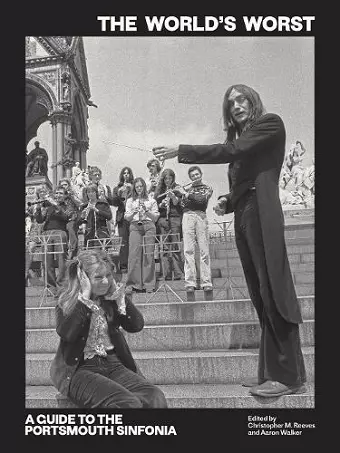The World's Worst
Guide to the Portsmouth Sinfonia
Format:Paperback
Publisher:Soberscove Press
Published:5th Jun '20
Currently unavailable, and unfortunately no date known when it will be back

Butchering the classics through avant-garde amateurism: the Portsmouth Sinfonia embodied the joyous collectivism of 1970s British counterculture In 1970, galvanized in part by the musical experiments of avant-garde composers Gavin Bryars, John Cage and Cornelius Cardew, students at Portsmouth College of Art in England formed their own symphony orchestra. Christened the Portsmouth Sinfonia, its primary requirement for membership was that all players, regardless of skill, experience or musicianship, be unfamiliar with their chosen instruments. This restriction, coupled with the decision to play “only the familiar bits” of classical music, challenged the Sinfonia’s audience to reconsider the familiar, as the ensemble haplessly butchered the classics at venues ranging from avant-garde music festivals to the Royal Albert Hall. By the end of the decade, after three LPs of their anarchic renditions of classical and rock music and a revolving cast of over 100 musicians—including Michael Nyman and Brian Eno—the Sinfonia would cease performing, never officially retiring. The first book devoted to the ensemble, The World’s Worst: A Guide to the Portsmouth Sinfonia examines the founding tenets, organizing principles and collective memories of the Sinfonia, whose historical position as “the world’s worst orchestra” underplays its unique accomplishment as a populist avant-garde project in which music, collectivity and humor all flourished. The unorthodox journey of the Sinfonia unfolds here through interviews with the orchestra’s original members and publicist/manager, magazine publications, photographs and unseen archival material, alongside an essay by Christopher M. Reeves.
The first book devoted to the philosophies and recollections of the Sinfonia, the book — and accompanying playlist, compiled by Chris Reeves and Aaron Walker, complete with playlist notes — reconstructs the aggressively avant-garde musical group’s cheeky claim to fame as “the world’s worst orchestra.” -- Shana Nys Dambrot * LA Weekly *
It sounds like a prequel to Flight of the Conchords: In 1970, a motley crew of students...created an orchestra in which members could only play instruments with which they had no experience, for the purpose of performing “only the familiar bits” of symphonic classics... * Artnet *
This volume, edited by Christopher M. Reeves and Aaron Walker, collects photographs, posters, articles, correspondences, ephemera and essays from members of the orchestra, and is a lot easier to read than their music is to listen to. As Mortimore wrote, 'You may find a freshness and excitement in its simplicity. Or you may not.' -- Michael Brodeur * Washington Post *
The World's Worst wisely avoids [...] single-string interpretations. A marvellously polyphonic and fittingly dissonant tribute. -- Abi Bliss * The Wire *
[The] World's Worst is a spirited collection of documentary ephemera, archival photographs, and liner notes that captures [the] Sinfonia's unlikely legacy as a soundtrack for a populist avant-garde. -- Eileen Cartter * Ursula *
What a teeming, joyful tribute to the Portsmouth Sinfonia this is. The World's Worst is a paean to art school experimentalism, to the creative value of amateurism and accidents, to the idea that conceptualism can also be anarchic and funny. -- Sukdev Sandhu * director of the Colloquium for Unpopular Culture, New York University *
The ramshackle texture, the historical context, the sense of humor, the egalitarianism, all the ways in which their world was one of radical potential—The World's Worst presents the Sinfonia in all its lumpy glory. -- John Corbett * author of Pick Up the Pieces: Excursions in Seventies Music *
The Portsmouth Sinfonia's sincere efforts to play the classics (on instruments chosen without the benefit of performer schooling) yielded nothing less than an as-yet-unsurpassed, unbridled joy for audience and musician alike. These key texts offer insight into the group dynamics and social and cultural relevance of the project and reminded this reader that the history of experiments in music includes a wealth of joyful paths not taken and worthy of revisiting. -- Hannah B Higgins * author of The Grid Book *
The historical accounts and remembrances herein are full of contradictions, pleasures, jokes and awkward moments between performers and audiences that always steer toward inclusion and veer from cynicism and pessimism. -- Anthony Elms * Daniel and Brett Sundheim Cheif Curator, Institute of Contemporary Art/ University of Pennsylvania *
This incredible book should serve as a guiding inspiration for every future shambolic disaster born of love. -- Benjamin Piekut * author of Henry Cow: The World is a Problem *
ISBN: 9781940190235
Dimensions: unknown
Weight: unknown
232 pages